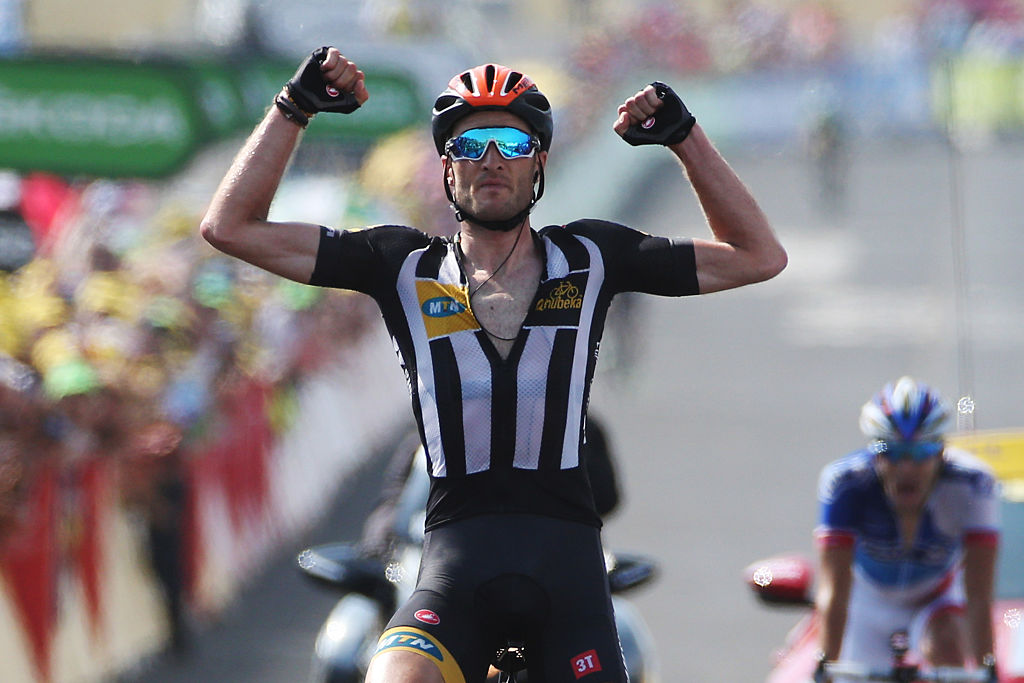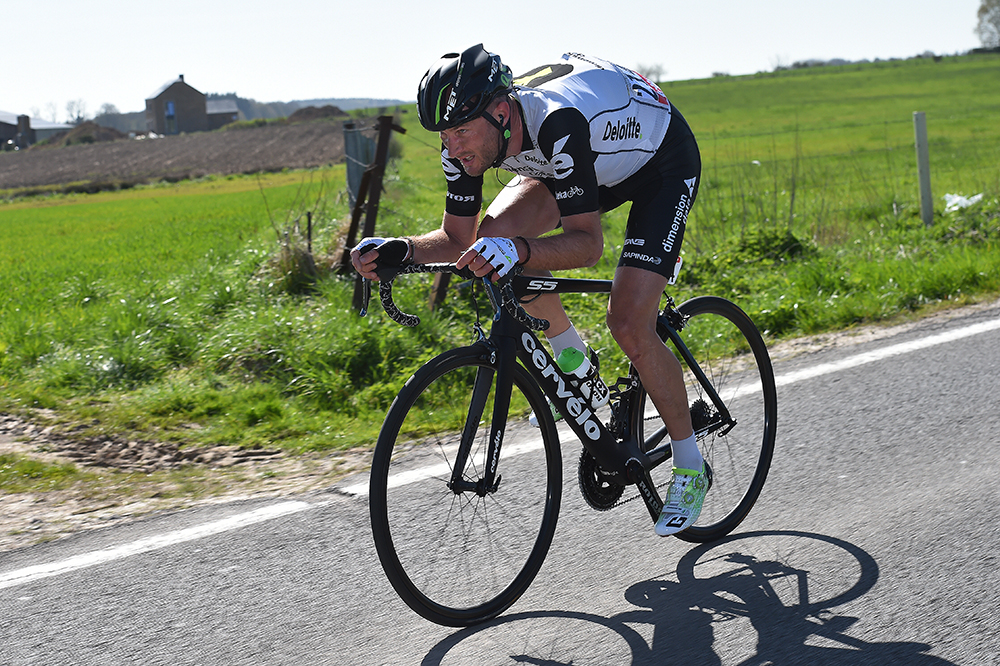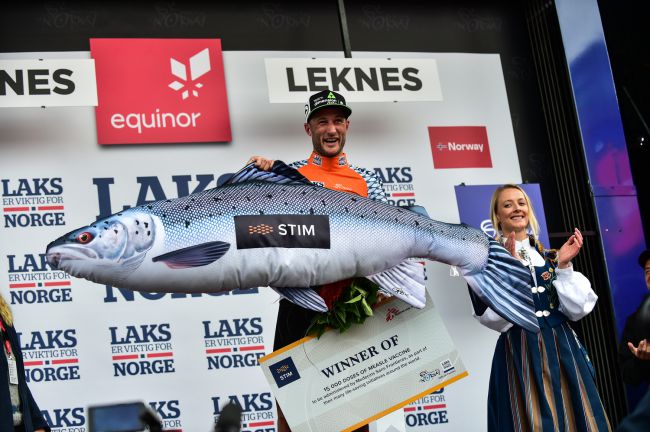Steve Cummings: The retirement interview
'I was always searching for the chance to win'

Dimension Data's Steve Cummings announced his retirement last week, bringing down the curtain on a 15-year career that included a career-defining victory in Mende at the 2015 Tour de France, and numerous other successes.
Cummings began his career on the track with Great Britain, winning medals in the team pursuit alongside Bradley Wiggins and Geraint Thomas. He then developed into a baroudeur, channelling his talents to target carefully crafted victories from breakaways and late attacks.
Cummings embodied professional cycling, constantly struggling against fatigue and injury in the hopes of a special day in the spotlight. He had hoped to race one more season and perhaps get a chance for a final victory in 2020, but a crash while riding the Tour of Britain on his home roads in Birkenhead, near Liverpool, left him with several fractured vertebrae. He was forced to accept it was time to start a new chapter in life.
News of Cummings' retirement sparked a wave of affection and support as people appreciated his achievements, his resilience and character. Cummings is intelligent yet humble, revealing his inner thoughts and emotions about his career and retirement when Cyclingnews went to see him at his base in Italy.
The day after, he began a road trip that would mark the start of his new life as a retired cyclist, and allow him to catch up with friends and former teammates, before returning to his family hope and his roots in Birkenhead, near Liverpool.
Cyclingnews: Were you surprised by the messages of support and gratitude when you finally announced your retirement?
Steve Cummings: Yeah, I was really surprised. It's very humbling and overwhelming, to be honest; I've had so many nice messages. I was going to go away quietly and avoid the spotlight, but I've realised I can't do that, so it's been quite emotional.
Get The Leadout Newsletter
The latest race content, interviews, features, reviews and expert buying guides, direct to your inbox!
When you're a professional rider, you're so engrossed in what you're doing, you don't have time to stop and look outside; you forget who you are and what it all means. That's what I'm doing now. My crash and back injury have stopped me doing things I'd like to do. For example, I can't ride my bike, so it's made the whole retirement process more difficult, but I know it'll pass.
My career taught me to deal with adversity, and so I know I have to be patient and stay positive as I go through a transition phase. I've had some nice messages from lots of people, and even from several riders who have been through the same process – people I look up to, like Manuel Quinziato and Igor Antón. Their messages really helped me to not feel alone because I know they've retired and transferred to ordinary life really well.
CN: You waited until late into the winter to make your announcement. Was there a specific reason?
SC: I wanted to have explored all the possibilities of racing in 2020. I would have maybe liked another year, but it is what it is. I can accept stopping now.
I know I wasn't in the best position to get a new contract. It's better to be out performing on the road and in the spotlight than in a hospital bed or wearing a neck brace. If I was young, a team might have taken a chance on me, but when you're 38, people think you're going to fade. That happens eventually, but I didn't feel I was fading, and my numbers didn't reflect that.
We explored everything, and when nothing came up, I was a little sad and a little scared about the future. But in the end, I feel really grateful and feel privileged to have followed my dreams and to have raced for so long.
I started cycling as a kid to keep me out of trouble, and I've always loved it and loved the freedom it gave me. I enjoyed 90 per cent of what I did as a pro, so I feel very fortunate. I'm in a great position to go forward and select what I want to do for the rest of my life. I want to continue to learn and develop, and to transfer my talents and experience to a different way of life to help myself, my family and other people. That's what important to me now.
It's kind of ironic that my last race ended near Birkenhead Park [near Liverpool – Ed] because that's where my racing began as a kid. My wife always says I forget bad things over time but always remember the good things, and that's already the case with my crash. I have a photograph from the start of the stage I'll always remember. My daughter and my wife are there, my dad's in the shot, my uncle, my brother and his kids, too. Everyone has a smile on their faces and that's really nice, that's what I'll remember from the last day of racing.
It ended with my crash and ultimately my retirement, but that's elite sport and you have to deal with it. I'm fortunate in that I'll have no long-lasting effects of the crash. It's only one race at the end of my career; it doesn't reflect my whole career.
CN: As you look back at your career, how do you see it?
SC: I honestly don't have any regrets because I've been on a journey of finding myself. I'm just full of gratitude to my wife and family who have shaped their lives to give me the opportunities I've had. There are things I might have done differently, but cycling has taught me so many life lessons that I'm super grateful for. I always tried my best, and there were some things outside of my control, but they're not things I can regret.
The biggest thing cycling has taught me is to be humble and to appreciate what I've been given. I'm very grateful to have made a living from what I really love doing.
I think I had a strong work ethic from my family background before I became a rider, but racing for so long definitely helped it develop further. Cycling has made me more of a rounded person and given me so many experiences. I've learned different processes and ways to better myself as an athlete. And I think those processes are transferable to normal life. That's what I'm trying to do now.
A maverick?

CN: You were successful but didn't always fit in to professional cycling's hierarchy; do you consider yourself a maverick?
SC: I guess there are elements of a maverick in me. At times I've tried to be the perfect teammate, and I tried to fit in. For example, I did a big shift when Cav [Mark Cavendish] won the world road race title in 2011. I've done similar things over the years, and this season, but often that work is not appreciated or seen. Look at me: I haven't got a contract for 2020! A domestique can do a perfect job and make a huge difference, but sadly some managers don't recognise the qualities and the true value of a domestique.
Cycling is strange in that it's a team sport built around helping an individual win. Contracts are short and people frequently change teams. So to build a team culture, a winning mentality and to establish leadership in cycling is really challenging.
I felt empowered and got the best out of myself when I tried to win bike races. I think I was better as a maverick and trying to win on days that didn't suit the sprinters or the fight for GC. They were my days. But it took a lot of work and my chances were rare. I tried to find a niche and focus on that.
My dream as a kid was always to win a stage at the Tour de France, and so I worked to break that down and understand how I could do it. It's what got me out of bed every morning and drove me to get the best out of myself. Without that goal, that dream, without the goal of winning races, I wouldn't have been the same athlete. I'd have drifted. I did drift for some parts of my career but, ultimately, I was always searching for the chance to win. I think I did that in a very difficult sport.
These days winning from a break is getting more difficult, but perhaps because it's not normal and it goes against the grain, I think people love to see that. When I was a kid and I watched the Tour de France, I loved when the breakaway went and carefully observed how it would play out. I used to pick a rider and see how they did it. I learned who looked the strongest; I studied who was fastest and how they won. When they won, it was special and often made their careers.
CN: Like that day to Mende at the 2015 Tour de France, when you beat Thibaut Pinot and Romain Bardet to win on Mandela Day for MTN-Qhubeka.
SC: Yeah, it was a great day for me and for the team. It was a career-defining moment, and I realised that it changed how people saw me as a bike racer. It gave me the confidence to do more, and do better. I was, what, 35 when I won at the Tour? That's kind of late, so you think your chance has gone, and then it happened.
I was really consistent that year, and I really enjoyed working with team manager Brian Smith. I think he could really understand my qualities, and so he created a space for me in the team. MTN-Qhubeka were an underdog team in 2015, and so it was a success just to be at the Tour. It was all groundbreaking with the African connection. Daniel Teklehaimanot wore the polka-dot jersey in the first week, and so momentum just built and built. We were pushing and helping each other. That helped me on the day to Mende.
Learning a new process, starting a new phase in life

CN: Is starting life as a former professional somehow similar to learning how to win bike races? Is it the start of an exciting new process?
SC: It's new and exciting, but also scary. Ultimately, my priority is for me and my family to be healthy and happy.
After December, I won't have a salary. Fortunately, I'm not a flash guy, and so if I want or need something, I can buy it without too much worry. I think my wife and I have done well by keeping our feet on the ground. But you've still got to work because there's a lot of life ahead of us.
I don't know exactly want I want to do. That's why I'm exploring as many options and avenues as I can. I'm speaking to people who I respect and who've done similar things; I'm investigating things that excite me as I look for a future path in my life. I'm interested in sports management and sports culture, and, of course, I love cycling, too. I think my strengths are understanding what happens in races, and the best way to maximise a performance for yourself and your team. I think that's a useful quality, and I've been analysing how that thought process can be used.
I've seen how people like Dave Brailsford and others do that, how they learn from other sports to make cycling better. Maybe there's room to learn from other sports and to improve performance in cycling. I'd be excited to help with that. I'm also studying business and sports management, and I'm fascinated by public and corporate speaking. I'm going to need new challenges, and I'm open to exploring them until I find what excites me and makes me happy, just as bike racing did.
Of course, I also want to enjoy doing other things in my personal life. I value time more than money, so you've got to find a balance. Simply earning or spending money doesn't make me happy. For example, I love martial arts and want to do it. I like the discipline of it and the mental positivity of it all. I did it as a kid, and really enjoyed it. Now I want to go back and try it again.
Winning a Tour de France stage was always a life-long dream. It makes the hairs on my arms stand up even now. Strangely, after I did it in 2015, I was lost for a few months; it was a hard moment in my life because I had to find a new goal. I'm probably in a similar situation now. I want to do something, but I'm not sure exactly what.
I was hoping to race one more year in 2020, but then I crashed and it didn't happen. If I'd found a team, I'd only have delayed this process for another 12 months, so now I'm starting the next chapter a year early. I've got the feeling that I've been given an earlier start to the rest of my life.

Stephen is one of the most experienced member of the Cyclingnews team, having reported on professional cycling since 1994. He has been Head of News at Cyclingnews since 2022, before which he held the position of European editor since 2012 and previously worked for Reuters, Shift Active Media, and CyclingWeekly, among other publications.